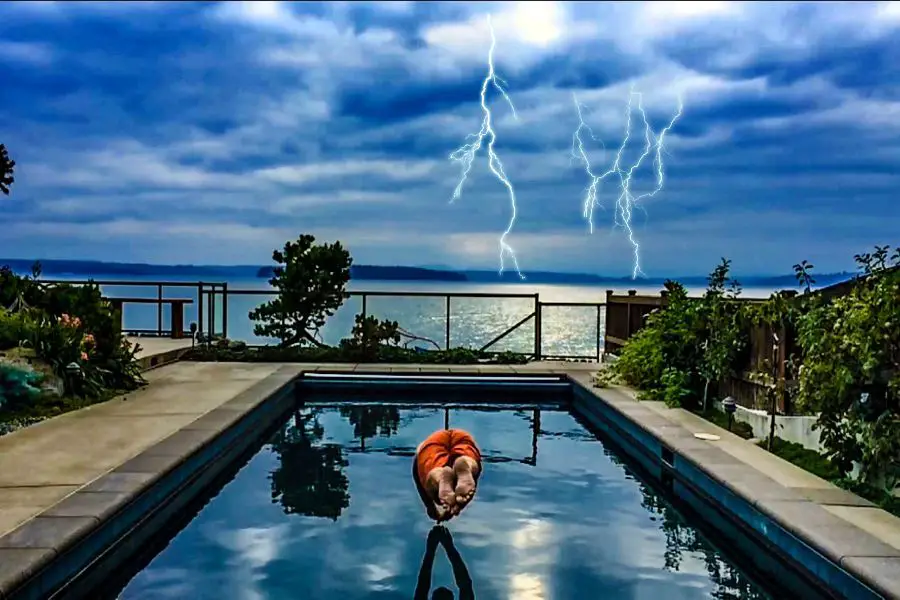Getting struck by lightning sounds scary, but luckily, it’s an extremely rare event. If you live in an area where lightning and thunderstorms occur often, you might already know all the safety precautions needed.
One of these precautions is to stay away from bodies of water since water is an excellent conductor of electricity. So, this begs the question, can you get struck by lightning in a pool?
A pool is probably one of the worst places anyone can be in during a thunderstorm. The swimmer not only deals with the risk of a direct lightning strike, but also the effects of lightning by proximity. In that unfortunate case, they might get electrocuted.
In this article, we’ll explain everything regarding pools and thunderstorms. Let’s dive in!
Is It Possible to Get Struck by Lightning in an Outdoor Pool?
In short, yes it is totally possible for someone to be struck by lightning in a pool.
Although lightning is attracted to higher objects, it won’t discriminate against lower lying objects such as pools. In fact, water is a great conductor of electricity which could increase the chance of lightning hitting the water versus land.
Additionally, if someone’s head is above the surface of the water during a thunderstorm, it may serve as a lightning rod. This will increase the odds of being directly struck by lightning compared to the odds of lightning hitting the surrounding water.
However, it can be hard to pinpoint the probability of someone getting struck by lightning while in a pool. That’s because it’s an extremely rare event, and it’s hard to tell the exact odds of it happening.
In general, the odds of a person being struck by lightning in the U.S. are 0.006% throughout their lifetime. While only 10% of people struck by lightning end up dying, nearly half of lightning-related deaths were near bodies of water.
What Happens If Lightning Strikes a Pool?
While a direct lightning strike on a person is a definite possibility if swimming in a thunderstorm, there is also potential of being electrocuted if lightning hits the pool water or any of the surrounding plumbing or fixtures.
Lightning striking the pool is basically the same as putting a toaster in a bathtub. This is because water acts as a great conduit, or distributor, of electricity. By swimming in a pool you’re significantly increasing the overall surface area for which lightning could hit you by proximity.
If someone happens to be in contact with electrified water, they’ll likely suffer at least an electric shock or worse. Depending on how close the lightning strike is to the person, they may be more likely to be killed.
For these reasons, it’s best to avoid swimming during a thunderstorm.
What Happens If Someone Gets Struck by Lightning in a Pool?
Getting directly struck by lightning while being on land or in a pool wouldn’t make a difference. The human body usually can’t handle an electric shock either.
An electric shock might cause cardiac arrest, which means the heart will stop pumping blood to the rest of the body. Additionally, it can cause severe thermal burns all over the skin, or in deep layers.
In some severe cases, an electric shock may lead to brain damage or death.
However, many lucky people around the world have survived getting struck by lightning.
Some of these people survived with mild burns, while others had more severe problems that affected them for the rest of their lives.
Oddly enough, these problems and health issues were unrelated. For example, some people suffered memory loss, others suffered from constant headaches.
Sadly, some people suffered from various heart implications after the event. In other words, most of the complications were related to the brain and the heart.
What to Do If Lightning Strikes Near You While in a Pool
One of the most popular myths about lightning is that it never strikes the same location twice. Surprisingly, though, lightning often strikes the same place multiple times!
That said, you should never be out during a thunderstorm. If you happen to be in the pool and lightning strikes near you, you should immediately get out of the pool and take cover inside.
In fact, everyone should get out of the water the first time they hear thunder or see any signs of a thunderstorm. No matter how far away the thunderstorm seems, lightning has ability to travel large distances. The longer you wait outside, the more dangerous it will be in the pool.
The safest thing to do is to stay inside in a place surrounded by walls and away from any electrical conducting objects.
Is There a Way to Safely Use the Pool During a Thunderstorm?
While the odds of this happening are very low, you shouldn’t gamble your safety on those numbers. In fact, you’ll be risking your life.
You should avoid using outdoor pools during thunderstorms. If the skies turn threatening it’s best to exit the water immediately and head indoors.
If you absolutely must use a pool during a thunderstorm, indoor pools are a safer option. Indoor pools are likely to be better bonded and grounded which would eliminate risk that electricity would travel through the water.
In the rare event that you’re stuck in the water during a thunderstorm, it’s best to try to remain below the surface of the water. Most of the electrical discharge occurs at the water’s surface, which is why fish often survive lightning strikes that occur in natural bodies of water.
A common rule of thumb is to wait at least 30 minutes after the last rumble of thunder or lightning flash before returning to the pool –this often applies to both outdoor and indoor pools. It’s always better to be safe than sorry!
Final Takeaway
Can you get struck by lightning in a pool? Yes!
Being in a pool doesn’t reduce your chances of being struck by lightning. It’s quite the opposite; being in a pool increases your chance of being hit by lightning.
Even if you’re not directly hit by the lightning, the surrounding water will distribute the shocking effects to any swimmers. This may ultimately lead to electrocution and death.
So, the best way to protect yourself from lightning is to stay inside during thunderstorms. Wait for at least 30 minutes after the last signs of thunder or lightning before returning to the pool.
Now that you know whether you can get struck by lightning in a pool, maybe you’re curious about whether you can truly get injured during a belly flop?
Happy (Safe) Swimming!
Husband and father of three (actually, four if you include the pool). I’m an avid DIY-er and weekend warrior that enjoys taking up new projects around the house to help us maximize leisure right at home. I enjoy researching and sharing various tips, tricks and knowledge to help others make their home an oasis.

